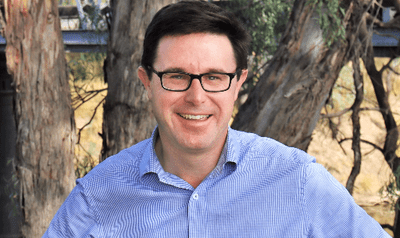
Minister for Agriculture David Littleproud.
PACIFIC island workers can be trained to shear sheep in Australia and shearers from other countries will be granted entry under regulatory changes confirmed by the Federal Government.
Minister for Agriculture David Littleproud broadly outlined the changes at a wool industry roundtable last week and also told Victoria’s ABC Country Hour that shearing has been classified as a critical skill.
“Therefore, anyone can bring a shearer in at the moment, with the exemption from the Australian Border Force commissioner, so he can provide that exemption for a visa.
“So if people find someone from a country — no matter where they are — we’re waiting on advice back from the Immigration Minister in terms of whether there’s some further reforms of Pacific Labour Scheme and Seasonal Worker Program that can be implemented,” Mr Littleproud told presenter Warwick Long.
“But effectively, the way that we are transitioning into that system, there is an opportunity to do that.”
“The ag visa will pick these up for the countries that sign up and we’re just finalising some of those bilaterals now and so as soon as those countries sign up, well, there’ll be an opportunity to bring those workers in through the ag visa as well.”
Pacific island workers coming into Australia under the Pacific Australia Labour Mobility (PALM) scheme had previously been unable to be trained as shearers because it was listed as skilled labour.
A Department of Agriculture spokesperson told Sheep Central this week that workers with critical skills to maintain the supply of essential goods and services, such as agriculture (including shearing), can now seek an individual travel exemption from the Australian Border Force Commissioner to come to Australia.
It has not been specifically confirmed that any of the regulatory changes will mean that Northern Hemisphere shearers will be allowed entry to alleviate Australia’s shearer shortage, but the department spokesman said workers under the Pacific Australia Labour Mobility (PALM) scheme will now go through a separate process and do not need to apply for a travel exemption from the ABF Commissioner.
The spokesperson said the wool industry, like all agriculture sectors, is open to using the PALM scheme to bring workers into the country.
“Recent changes provide additional support for workers, including a new skills development program to provide opportunities for workers to access training up to certificate level while working in Australia.
“The government is currently working through further reforms to the PALM program as part of its realignment process,” the spokesperson said.
“We have also created the Australian agriculture visa which will provide for the entry and temporary stay of workers across primary industries sectors, once partner country negotiations are complete.
“It will be open to applicants from a range of countries and we are already in talks with a number of countries in our region who are eager to participate,” the spokesperson said.
Shearer Contractors Association of Australia secretary Jason Letchford said if he interpreted the changes correctly, the industry could access unskilled workers through PALM, employing them as shed hands and then upskill them into shearers.
“I think I can say that this is new to the shearing industry, as the PLS and Schemes have been limited to ‘unskilled’ workers.
“The SCAA will certainly be exploring this opportunity to bring in these workers, which will have medium and long terms benefits to the industry, in terms of skilled labour supply,’ Mr Letchford said.
Success after five-year Pacific island worker campaign

AWGA director Robert Ingram
Australian Wool Growers Association director, long-time supporter and architect of facilitating Pacific island workers into the industry, Robert Ingram, said there was still a need for clarification that the pathway that brings overseas shearers into Australia is permanent. New Zealanders shearers are already allowed to work in Australia under the Closer Economic Relations arrangement.
“Australian Wool Innovation has previously indicated to me in relation to training islanders through extensive discussions that have included the shearing contractors, that they would support training of Pacific workers wanting to come into the industry.
“It was further discussed that one of the agricultural schools or research stations that have been supported under the Australian aid program in Fiji near Suva be used for introductory training,” he said.
“DFAT has previously indicated to me that through either the Pacific regional program or the bilateral program for Fiji they would support AWI running a wool industry training school in Fiji.
“DFAT sees it as a major win-win-win,” Mr Ingram said.
“It would support the Pacific, use facilities previously supported under the aid program and implement a program with the private sector that adds benefits to Pacific island communities and the Australian agricultural sector.”
Mr Ingram issues that now need to be addressed included supporting existing islander shearers in Australia as mentors, trainers and cultural supporters of workers when they come to Australia.
Mr Ingram said he first lobbied for Pacific island workers in the wool industry with the Department of Foreign Affairs and Trade in 2016, when the first changes were made to the skills allowed in under the Seasonal Workers Program. This resulted in shed hands being included under SWP from 2017, but not shearers, because it was a classified as a high-level skill under labour classifications by the then Department of Immigration. Mr Ingram said he started discussions with AWI on bringing in PALM workers for shearing in early to mid-2018.
“We haven’t achieved anything yet – no-one has been trained nor entered the country to work in the shearing industry under PALM and there is still an ocean of water and numerous rapids to negotiate before this happens.
“We need champions in AWI, DFAT, PLF, and the shearing contractors and wool producers in Australia for this to succeed,” Mr Ingram said.
The sixth generation wool producer said he was one of the group of people responsible for developing the seasonal worker program, was the first team leader of the Labour Mobility Assistance Program and remains the policy and sector analyst to LMAP’s successor the Pacific Labour Facility (PLF).
ABF exemptions explained
A spokesperson for the ABF said the Australian Government is mindful of the need to keep the national economy on a strong footing, to position Australia for an effective post-COVID-19 economic recovery.
“To assist in that goal, the Commissioner of the Australian Border Force may grant an individual exemption from Australia’s international travel restrictions for people with critical skills required to maintain the supply of essential goods and services.
“This includes skills in medical technology, critical infrastructure, telecommunications, engineering and mining, supply chain logistics, aged care, agriculture (including shearers), primary industry, food production, and the maritime industry,” the spokesperson said.
The Commissioner’s Guidelines on the travel exemption process can be found in full on the ABF website: Commissioner’s Guidelines: Decision making about individual exemptions from Australia’s inwards travel restriction policy (homeaffairs.gov.au),
Travellers who believe they meet one of the exemption categories can request an exemption using the Travel Exemption Portal
The spokesperson said an individual can submit a request for a travel exemption under these categories, or a business can submit a request on their behalf. Evidence of current employment in Australia must be provided. The applications of multiple travellers within the same group/business can be linked, so that the requests are considered together.



HAVE YOUR SAY